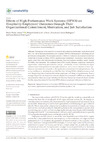Please use this identifier to cite or link to this item:
https://accedacris.ulpgc.es/jspui/handle/10553/106233
| DC Field | Value | Language |
|---|---|---|
| dc.contributor.author | Dorta-Afonso, Daniel | en_US |
| dc.contributor.author | González-de-la-Rosa, Manuel | en_US |
| dc.contributor.author | García-Rodríguez, Francisco J. | en_US |
| dc.contributor.author | Romero-Domínguez, Laura | en_US |
| dc.date.accessioned | 2021-03-25T10:30:37Z | - |
| dc.date.available | 2021-03-25T10:30:37Z | - |
| dc.date.issued | 2021 | en_US |
| dc.identifier.issn | 2071-1050 | en_US |
| dc.identifier.other | Scopus | - |
| dc.identifier.uri | https://accedacris.ulpgc.es/handle/10553/106233 | - |
| dc.description.abstract | The purpose of this research is to examine the underlying mechanisms inside the so-called black box that relate high performance work systems (HPWS) with employees’ well-being and job performance in hospitality. We surveyed a sample of 494 hotel workers to test a research model that related the following variables: HPWS, organizational commitment, motivation, job satisfaction, quality of life (QoL), and individual job performance. Structural equation modelling, namely through PLS-SEM, was conducted. We confirmed that HPWS directly influence employees’ motivation, organizational commitment, job satisfaction, and QoL. Additionally, workers’ motivation and organizational commitment positively influence job satisfaction, which, in turn, enhances workers’ QoL. Moreover, job satisfaction and quality of life significantly predicted individual job performance. This study contributes to unlocking the so-called black box relating HPWS with job outcomes as well as to the growing body of research that relates employees’ well-being with performance. From a managerial point of view, hospitality firms should prioritize investment in HPWS, as its design and implementation affects employees’ attitudes and behaviors. Future lines of research should consider bundles of practices instead of the whole HPWS effects on employees’ attitudes and behaviors. | en_US |
| dc.language | eng | en_US |
| dc.relation.ispartof | Sustainability (Switzerland) | en_US |
| dc.source | Sustainability (Switzerland) [EISSN 2071-1050], v. 13 (6), 3226, (Marzo 2021) | en_US |
| dc.subject | 531104 Organización de recursos humanos | en_US |
| dc.subject.other | Trabajo | en_US |
| dc.subject.other | Hospitales | en_US |
| dc.subject.other | High Performance Work Systems (HPWS) | en_US |
| dc.subject.other | Human resources management | en_US |
| dc.subject.other | Job satisfaction | en_US |
| dc.subject.other | Organizational commitment | en_US |
| dc.subject.other | Quality of Life | en_US |
| dc.title | Effects of high-performance work systems (HPWS) on hospitality employees’ outcomes through their organizational commitment, motivation, and job satisfaction | en_US |
| dc.type | info:eu-repo/semantics/article | en_US |
| dc.identifier.doi | 10.3390/su13063226 | en_US |
| dc.identifier.scopus | 85103119706 | - |
| dc.contributor.authorscopusid | 56725788200 | - |
| dc.contributor.authorscopusid | 57211082521 | - |
| dc.contributor.authorscopusid | 7004619946 | - |
| dc.contributor.authorscopusid | 57210854436 | - |
| dc.identifier.eissn | 2071-1050 | - |
| dc.identifier.issue | 6 | - |
| dc.description.firstpage | 3226 | en_US |
| dc.relation.volume | 13 | en_US |
| dc.investigacion | Ciencias Sociales y Jurídicas | en_US |
| dc.type2 | Artículo | en_US |
| dc.description.notas | This article belongs to the Special Issue Leadership and Sustainable Human Resource Management in the Tourism and Hospitality Industry | en_US |
| dc.utils.revision | Sí | en_US |
| dc.date.coverdate | Marzo 2021 | en_US |
| dc.identifier.ulpgc | Sí | en_US |
| dc.contributor.buulpgc | BU-ECO | en_US |
| dc.description.sjr | 0,664 | |
| dc.description.jcr | 3,889 | |
| dc.description.sjrq | Q1 | |
| dc.description.jcrq | Q2 | |
| dc.description.scie | SCIE | |
| dc.description.ssci | SSCI | |
| dc.description.miaricds | 10,6 | |
| dc.description.erihplus | ERIH PLUS | |
| item.grantfulltext | open | - |
| item.fulltext | Con texto completo | - |
| crisitem.author.dept | GIR IDeTIC: División de Organizaciones, personas y conocimiento | - |
| crisitem.author.dept | IU para el Desarrollo Tecnológico y la Innovación en Comunicaciones (IDeTIC) | - |
| crisitem.author.dept | Departamento de Economía y Dirección de Empresas | - |
| crisitem.author.dept | GIR IUCES: Centro de Innovación para la Empresa, el Turismo, la Internacionalización y la Sostenibilidad | - |
| crisitem.author.dept | IU de Cibernética, Empresa y Sociedad | - |
| crisitem.author.dept | Departamento de Economía y Dirección de Empresas | - |
| crisitem.author.orcid | 0000-0002-9955-1202 | - |
| crisitem.author.orcid | 0000-0002-4981-4529 | - |
| crisitem.author.parentorg | IU para el Desarrollo Tecnológico y la Innovación en Comunicaciones (IDeTIC) | - |
| crisitem.author.parentorg | IU de Cibernética, Empresa y Sociedad | - |
| crisitem.author.fullName | Dorta Afonso, Daniel | - |
| crisitem.author.fullName | Romero Domínguez, Laura | - |
| Appears in Collections: | Artículos | |
SCOPUSTM
Citations
72
checked on Jun 8, 2025
WEB OF SCIENCETM
Citations
73
checked on Feb 15, 2026
Page view(s) 5
262
checked on Jan 11, 2025
Download(s)
149
checked on Jan 11, 2025
Google ScholarTM
Check
Altmetric
Share
Export metadata
Items in accedaCRIS are protected by copyright, with all rights reserved, unless otherwise indicated.
